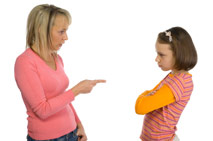Throughout western Europe and our culture's history, it has always been a given that boys and men were meant to be the aggressive ones; the hunters, providers, and the fighters. They have been taught to be the stern, powerful and "always right." Women on the other hand, have always been the ones to just do as their told. Considering these two cultures happen to be patriarchal ones, despite where we are today in comparison to the way things were centuries ago, we can all agree that we generally live in a Caucasian, white male society. So, when you stop to think about it, why can't we all agree that regardless of gender, why is it more or less "taboo" for females to be more aggressive and males to be more passive? This is where my main focus for these blogs is going to be placed; passive and aggressive behavior and who's "supposed" to be be what in our culture. I am also going to see whether or not I am biased.

These gender specific depictions of how little boys and little girls should be starts as yearly as once the child is born. From the baby being wrapped in a blue blanket or a pink blanket, from pet names like "buddy" or "baby doll," from G.I. Joe action figures to Cabbage Patch Dolls, from certain dress like skirts and khakis, from climbing trees to planting gardens, and from assumed behavior depending on gender and the expectations of the way these girls and boys are meant to act. Drained just thinking about it? More so in our cultures' past have these stereotypes been so cut and dry, but even today if you stop to think about your own upbringing, you can see the direction in which you were being sent. Personally, I was a "Tom-boy," yet my mother would make me wear dresses on holidays and the first day of school. I had the Barbie-dolls, Pretty Pretty Princess board games, and pile of bows and ribbons that you could lose a small child in. But on the other hand, I was riding bikes with the boys in the neighborhood, trekking through the woods to find slugs and snakes, and skinning my knees and getting callouses on my hands. Was I supposed to be doing this? Did the other parents think of me as too aggressive than a young lady should have been? At ten, these questions didn't even come to mind, but looking back on it eleven years later, I can only imagine.
To be aggressive, you could define it as masculine. You could also associate it with certain types of applied behavior, like in a workplace, with driving, or even personality traits and emotions like anger, for example. Aggression is also power-based behavior. The desire to be number one, to finish first, or to prove a point usually comes with the derived emotion of aggression. So with this laid out for us, is it safe to say that women can be aggressive, or does that thought make people a little uneasy?
To be passive, you could define it as predominately feminine. To be passive, you have to be laid back and willing to be walked all over in some situations. The passive person generally likes to avoid negative environments and prefers calmer settings. Another way to look at it would be the "peace and love" kind of group. Why is it then, that when a man is deemed "passive," that he is also considered less masculine?
I am going to dig deeper into the world of these gender based stereotypes of passivity and aggression and explain the ways in which these labels effect our relationships, careers, and culture. As our world is changing with more diverse political views, freedom and equality movements, and personally equipped beliefs, it would only be true to say that gender stereotypes are changing too, right?









